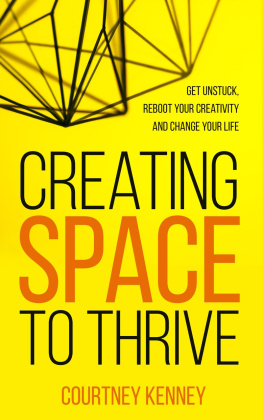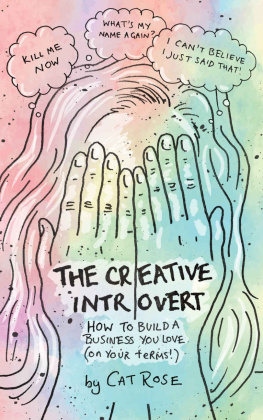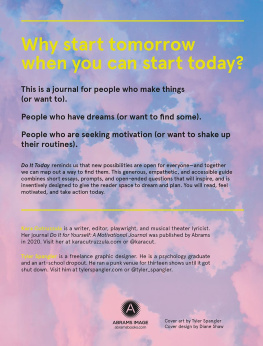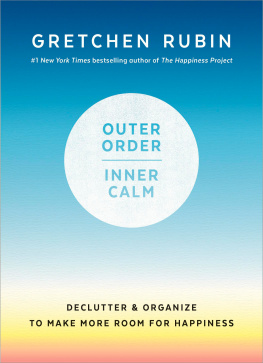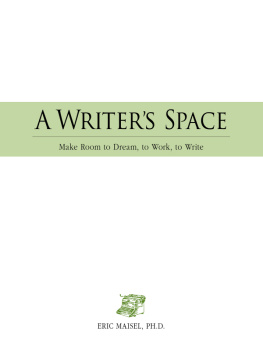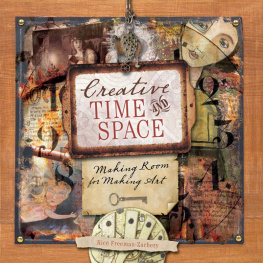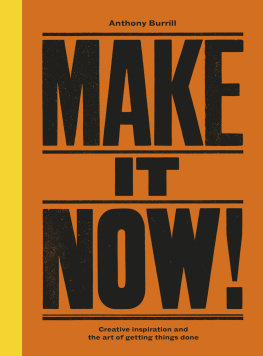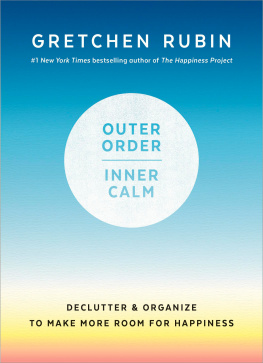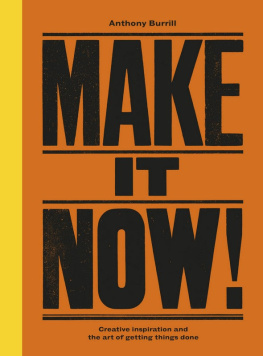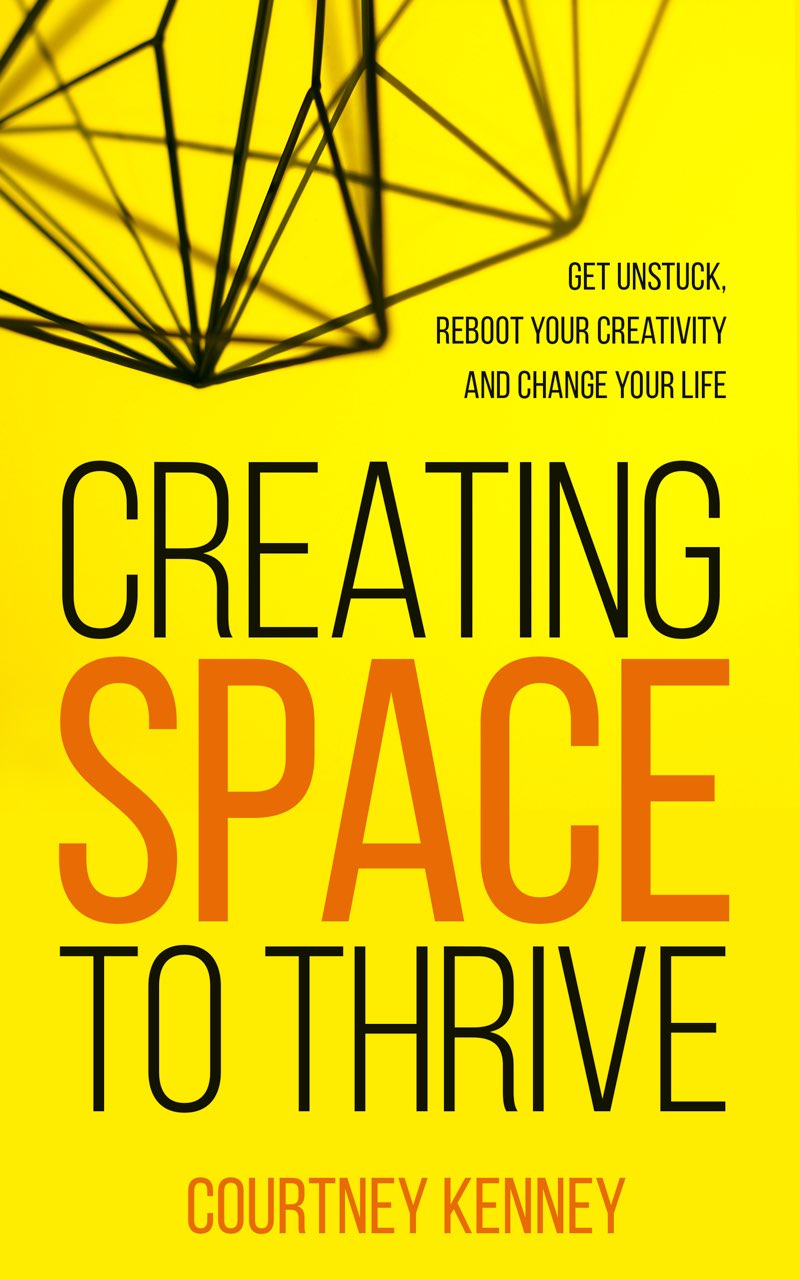This book is for Steve.
Thanks for challenging me to live a full life.
B ill Murrays character in the 1993 movie Groundhog Day is forced to live the same day over and over. He tries everything to change his situation, including kidnapping the towns main attraction, Punxsutawney Phil.
Unless youre a weather reporter, you probably wont find yourself assigned to a small town in Pennsylvania to report on the annual Groundhog Day festivities. But the movie serves as an allegory for self-improvement. Murrays character cant escape the loop until he finally puts the needs of others above his own.
The movie resonates with me because I felt stuck on repeat for so long. Maybe others feel that way too, and thats part of the films enduring charm.
Does your life feel stuck on repeat? Do you wake up each morning to live out what seems like the same day? Maybe you feel like something in your life is missing. If you feel stuck on a hamster wheel, you are not alone.
I want you to stop just getting by. Its time for you to thrive.
Creativity is the missing ingredient for many of us. Too many years spent grinding away at jobs we hate dull our senses. Have you lost your sense of curiosity? I did, for a long time. In this book, I describe how to connect with your creativity and create space in your life to engage in the activities that bring you energy and joy.
You can change your life with the approach I lay out in this book. Stop living Groundhog Day and choose a creative life where you thrive.
Why are we unhappy?
Many of us work jobs we dont like. Less than half of U.S. workers said they felt satisfied with their jobs overall, according to a 2016 report by the Conference Board. 2016 Gallup figures are worse; they found that only 32% of U.S. employees are engaged with work, and only 13% worldwide.
Consider that we spend 10,500 days at work (assuming five days a week, 50 weeks a year between the ages of 23 and 65). Said differently, we work 36% of the total days that were alive on this planet (should we live to be 80).
We spend a huge chunk of our lifetime at work, yet half of us hate our jobs. No wonder many of us feel stuck on repeat, living each day without much thought.
Thats the situation I found myself in a few years ago. I was unhappy. We all have bad daysthats a fact of lifebut it was more than that. I was deeply uncomfortable with my situation and the path down which my life was heading. It wasnt about regret. Something important was missing.
Despite feeling unsettled, there was much to be grateful for: good health, loving family, my husband, friends, and living in a peaceful time. I had built a good career, but I wasnt happy with my job anymore. Something was missing.
I lived for the weekends. Sunday nights were the worst because it meant going to work the next day. I became a bucket of angst thinking about the coming work-week and all my obligations.
Then, a close family member died unexpectedly, and I saw friends getting cancer at younger ages. I realized the stuff Id been told all my lifeWork hard, save all you can so you can afford the big house and retire comfortablywas not guaranteed to come true for everyone.
I started wondering what would give my life more meaning.
My WWII-generation grandparents worked hard and scrimped most of their lives, only to sit in front of the television day after day in their elder years. After retirement, when they could have traveled, they no longer desired to, or even had the energy for trips. Thats not how I wanted my life to be.
I was lucky to have supportive, career-minded friends. Many were passionate about their careers and loved their jobs. But many were like meshowing up at a job they didnt enjoy. I was nearly vegetative on weekends after a long week spent at a nine-to-five job and hours of unpaid overtime.
There must be more than this to life, I said to myself.
What gives your life meaning? Are you getting by, or are you thriving?
C onventional wisdom in industrialized countries says we must spend the majority of our lives working, buy houses with 30-year mortgages, and save an enormous amount of money for retirement.
Like me, you probably bought into that thinking and spent, or plan to spend, most of your life working toward your eventual retirement.
Now, I agree theres an advantage to putting aside income for your future. Not planning for your future is reckless. However, we are led to believe that we need a checklist of material things to live a happy, good life. We need that large house, the new car every two years, and all the stuff that drives our consumer economies. And so were conditioned to choose a Groundhog Day lifestyle where we work hard at a job we dont enjoy to maintain the lifestyle we are told to have.
Work hard, save for later. Put in your time. Pay your dues. Someday is coming.
The myth of someday is putting off pleasure, meaning, and experience because thats what we have been taught. Maybe you were raised to think work is a four-letter word and its not supposed to be fun. But think again! Does life need to be that way?
Why not discover what makes you happy now?
Why not reconnect with the activities that drive your passion and energy so you can move toward a life where you spend time in your happy place?
The myth of someday is when you say, Ill do x, y, z one of these days. Perhaps you think you dont deserve to pursue creativity nowthat you need to wait. Thats what others around you do, right?
You know youve bought into the myth of someday when you say:
- Well go on that dream vacation when we retire.

